by Mac Skelton, Hamzeh Al-Shadeedi & Zmkan Ali Saleem
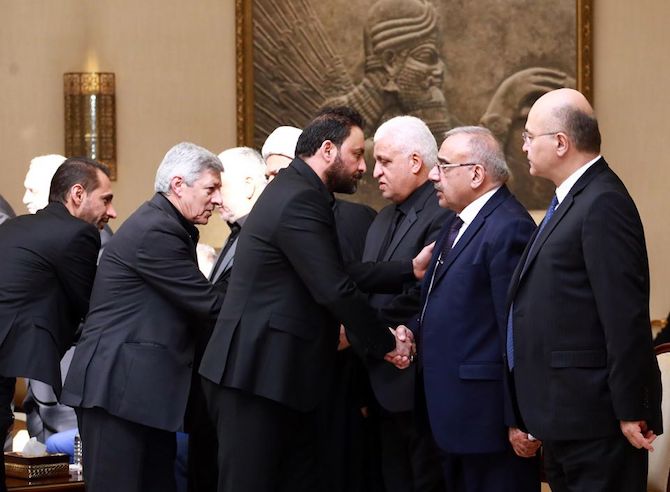
Amidst the ongoing policy conversation about US-Iran escalations and the consequences for the American presence in the region, scant attention has been given to the nuances of the positions of different Iraqi political factions on these matters. Perhaps this is because policymakers may assume that since Iran will ultimately dictate how Iraq’s major political actors move forward, a close examination of the various stances of domestic parties is beside the point. Recent history has shown, however, that even the groups in Iraq with the closest ties to Iran simultaneously operate according to their own political objectives and strategic interests, as they continuously compete with one another for influence and economic resources.[i] Longstanding divergent political and economic interests among the various Shi’a blocs have and will continue to manifest themselves both publicly and under the surface – with important implications on the potential for the removal of foreign forces. Moreover, the positions of the Kurdish parties, Sunni Arab factions, and that of the pro-reform protestors have and will continue to shape the question of US presence or withdrawal. Below we analyse the emerging positions of Iraq’s various political blocs.
THE SHI’A PARTIES: SYMBOLIC UNITY, ONGOING COMPETITION
Just before the US killing of Qassim Soleimani and Abu Mahdi al-Muhandis, the Shi’a political parties within the Iran-aligned Binaa Alliance (e.g., the Badr Organisation, Maliki’s State of Law, and Asaib Ahl al-Haq) were politically vulnerable amidst immense opposition from a mass pro-reform protest movement spreading across central and southern Iraq. Binaa’s relative isolation gave Iraqi President Barham Salih the political space to refuse their candidates for the premiership with the backing of other major Shi’a parties (e.g., Sadrists, Nasr, Hikma), the Kurdish parties, and the Sunni Arab factions. Binaa’s moment of weakness is no longer. In the aftermath of the recent US airstrikes and targeted killings, all of the major Shi’a parties expressed their condemnation of the attacks. With the exception of Haidar al-Abadi’s Nasr, all demanded the removal of American troops from Iraqi soil. Calls for a united anti-American stance reached a fever pitch. Yet important differences in rhetoric are notable both within and between the Shi’a factions.
Al-Binaa Coalition (Asaib al-Haq, Badr, State of Law)
The extreme end of the Binaa Coalition is employing heated rhetoric aimed at driving a wedge between those Iraqi parties who were with the anti-American ‘resistance’ and those who were not. Kurdish members of parliament received direct threats from Asaib Ahl al-Haq (AAH) and Kataib Hezbollah against any action that slowed the expulsion of US troops. Preparing for a likely terrorist designation for AAH imminently, al-Khazali voiced his opposition to any parliamentary session that did not immediately pass a legally binding measure to expel American troops. After the 8 January Iranian strikes directed at US bases in Anbar and Erbil, al-Khazali claimed that the ‘Iraqi response’ and ‘revenge’ would be just as strong and equally violent.
But Badr Organisation leader Hadi Ameri has not employed the language of violent ‘resistance’ or ‘revenge,’ and instead has spoken of a ‘response’ without much details as to what precisely this might mean beyond the ongoing parliamentary deliberations. This vagueness is in part due to his wider political ambitions (to become PMF Chairman and eventually Prime Minister), which requires working across factions and in collaboration with international partners. Some analysts have speculated that Ameri’s pragmatism would help ease tensions with the Coalition. During the commemorations of Qassim Soleimani, however, Ameri publicly vowed to expel all American troops. This somewhat more heated rhetoric is understandable given that he has to appeal to the extreme wings of his alliance, which includes Qais al-Khazali’s Asaib Ahl al-Haq (AAH) as well as the more radical factions within Badr itself. The Badr affiliated spokesperson for the north divisions of PMF has expressed that from now on, the ‘Jokers (i.e. protestors), Baathists, and traitors’ will be summarily eliminated. Badr is a large political-military apparatus encompassing widely divergent views, requiring Ameri to stake out his positions very carefully. It remains to be seen whether Ameri will successfully manage the significant fissures among the various components of his coalition.
Of all the major parties within Binaa, Nouri al-Maliki’s State of Law has taken the most ambiguous and careful course. In general however he has fallen in line with the broader position of voicing public opposition to American aggression, citing ‘breaches against Iraqi sovereignty’ and warning of the US intention to ‘commit more attacks against Hashd.’ Like Ameri, he likely holds ambitions of a broader political role once the dust settles.
Sadrists
The Sadrists have – true to their form – issued contradictory statements that make their long-term position essentially inscrutable. During the first week of January, Sadr sought to stake out a rhetorical space that was more extreme that than the radical wings of Binaa. Emphasising the need to humiliate the Americans, Sadr insisted upon the closure of the American embassy, the boycott of American products, and the prohibition of any communication with Americans, the violation of which would be treason. Simultaneously Sadr has revived the Mahdi Army (mostly symbolic, with little information available on changes on the ground) and called for the formation of an ‘International Resistance’ against foreign forces that would seek out military solutions to the American presence if political pressure failed. The intensity of Sadr’s rhetoric quickly propelled him into the limelight as the most visible standard bearer of the ‘resistance,’ signalling a desire to compete for a wider role. Subsequently on 9 January, Sadr suddenly muted his calls for the resistance, declaring that ‘radical groups’ should refrain from provocative actions against the US.
His strong rhetoric quickly returned, but increasingly became focused on mobilising a rival protest movement that would expel the Americans. On 14 January, he called for an ‘Iraqi revolution that is neither western nor eastern.’ (Khomeini used this same slogan in 1979, by which he meant neither capitalist nor communist. It is unclear whether Sadr was signalling this connection, however.). The call for a protest of ‘millions’ to be staged on 24 January is mainly directed towards the expulsion of American troops. It remains to be seen if this new Sadrist wave of protests will, as some analysts warn, create a permanent rupture in the broader protest movement.
Sadr’s volatility is not new, but in this tense political environment the unpredictably of his positions has become a major destabilising factor. Sadr has long sought the maintain a national profile and often seems indecisive on how best to achieve this end. He is also under pressure from various forces – including the Iranian regime – and often responds unpredictably to these influences.
Others (Ataa, Hikma, Nasr)
PMF chairman Falih al-Fayyadh’s Atta party has arguably been nudged closer to Binaa as well as the Iranian regime. Fayyadh had long been viewed as a mediating figure between the PMF and Western powers due to his dual role as PMF chairman and the GoI’s National Security Advisor. In his capacity as National Security Advisor, he visited the Pentagon for a meeting with the US Secretary of Defense in October 2019. This centrist image started to erode both within and outside Iraq during the protests, as he was allegedly involved in directing the Iran-backed violent crackdown against demonstrators. In recent days, US officials have referred to him as a proxy of Iran due to his participation in the demonstration in front of the US embassy. He made a very public appearance at the funeral of Qassem Soleimani, addressing Khamenei as the ‘Leader’ with no reference to nationality. However, the way forward for Fayyadh is not clear. On the one hand he needs to shore up support across the PMF, and on the other his Atta parties includes Sunni Arab figures and tribal leaders in Kirkuk and Mosul whose position on US troops in Iraq is quite blurry, but who generally oppose outright removal.
Hikma leader Ammar al-Hakeem has voiced strong opposition to American airstrikes and the removal of American troops, but has consistently insisted upon the employment of normal parliamentary procedures instead of violent resistance. Hikma has very little leverage over the current political conversation, and the party’s moves will be dictated by the needs of self-preservation rather than any realistic prospect of driving the political debate.
Haider Abadi’s Nasr has taken the outlier position among the Shi’a parties. While Abadi has expressed opposition to Trump’s demands for reimbursement of the costs of Asad Airbase, his bloc has not fallen in line with the push to expel the Americans. Only 3 to 5 of their 25 MPs showed up for the parliamentary session demanding the withdrawal of American forces. The head of Nasr’s parliamentary coalition Adnan al-Zurfi publicly voiced opposition to the vote, stating that Iraq would ‘lose an important ally’ and ‘make a strong enemy.’ Nasr has become progressively weaker since the elections of 2018, and their emerging stance is probably best understood as an effort to claim the pro-West space – their last and only hope of relevance.
THE KURDISH PARTIES (KDP & PUK)
The KDP and PUK have been divided since the October 2017 referendum but have showed unusual unity in this crisis, boycotting the Iraqi parliament vote on removing US forces. At the same time, the Kurdish leaders have acted very cautiously towards Iran and the Shi’a parties. KDP and PUK officials attended commemorations for Qassim Soleimani in the Iranian consulates in Erbil and Sulaymaniyah. They are not engaging in rhetoric against the Shi’a parties for a number of reasons, not the least of which is the need to maintain current levels of petrodollar transfers from Baghdad. On 8 January, top KDP and PUK officials met about the evolving situation. After the meeting and press conference, KRG President Nechervan Barzani and Prime Minister Masrur Barzani spoke only euphemistically about ‘todays’ events’ so as to not mention Iran’s attack directly. Later, on 11 January, caretaker Prime Minister Adel Abdul Mahdi travelled to Erbil for meetings with the KRG Presidency. Nechervan once again asserted the necessity of foreign troops while also conveying the importance of good relations with Iran. Trade, politics, and geography tie Iraqi Kurds to Iran. The PUK and the KDP do not want to be seen as part of an anti-Iran front. Yet, at the same time, the leaders confirmed in strong terms that Coalition forces must not leave and must continue fighting ISIS. They are wary of a 2011 scenario in which the dominance of Iran/Shi’a parties over Iraqi politics and economy sidelined them.[ii] In sum, the PUK and KDP are very anxious. They need the US presence to guarantee the security of the KRG, but they also recognise that Iran can inflict great damage politically, economically and militarily.
THE SUNNI ARAB BLOCS
Most Sunni Arab politicians boycotted the parliamentary session to expel foreign troops from Iraq; however, they were not able to stake out a unified position like their Kurdish counterparts. This is yet another indication of Sunni parties’ inability to cohere behind a single agenda ever since the US-led invasion of 2003. Over the past seventeen years, Sunni Arab parties and leadership have struggled to expand their constituencies. Instead they have witnessed the fragmentation of their votes among multiple small parties and coalitions. The largest Sunni coalition of Osama al-Nujaifi obtained only fourteen seats in the current parliament while Mohammed Halboosi’s party has only six seats. Ironically, the largest bloc representing Sunni interests in the Parliament was long headed by the secular Shi’a Ayad Allawi, but he has resigned in recent days as a show of broad opposition to the caretaker government and a failed parliament. (Allawi has subsequently issued statements asserting that the caretaker government cannot expel foreign troops, and condemning Iran and the US for making Iraq a battleground for their war.) The fragmentation of the Sunni parties has limited their leverage on the national stage and has often made them hostage to Shi’a and Kurdish parties’ influence. Some have opportunistically chosen to side with Kurdish or Shi’a parties to advance their personal gains. This cooptation became even more rampant in the aftermath of ISIS, as the extension of Shi’a parties’ influence into Sunni Arab areas such as Mosul compelled Sunni Arab politicians to strike opportunistic short-term deals in exchange for assets and cash.[iii] Accordingly, while the Sunni Arab factions stand to lose greatly in the case of a complete US withdrawal (as it would leave them more vulnerable to the whims of the Shi’a parties), it is hard to anticipate a robust Sunni Arab position on this issue for the reasons outlined above.
IMPLICATIONS FOR THE PROTESTORS
Until the recent US-Iran escalations, a mass pro-reform protest movement was the central issue in Iraqi politics. A separate piece on the current status of the protests will follow in the coming week, but here we will briefly shed light on how Soleimani’s killing has affected the movement. After the US strikes, there has been a marked increase in the level of threats and intimidation by pro-Iran factions such as Kataib Hezbollah and AAH, who have now directly or indirectly declared all protesters to be implementers of a US agenda – despite the consistent assertions of demonstrators that they vociferously oppose both American and Iranian meddling in Iraqi affairs. Protesters in Nasiriyah and Basrah were targeted and killed, and had their tents burned for refusing to hold a symbolic funeral for Soleimani and al-Muhandis. Significantly, Soleimani’s killing has pulled media and international actors’ attention away from the protesters, reducing their ability to make their voices heard and actions visible. Finally, as mentioned previously, the Sadrists are attempting to mobilise a rival anti-US protest movement with mass demonstrations scheduled for January 24. Nonetheless, the pro-reform protestors have re-grouped and staged new demonstrations despite pressures from Sadrists and the ongoing brutal crackdown. They show no signs of retreating and will likely continue to shape the political debate.
CONCLUSIONS
While the recent escalations have shaped the short-term positions and rhetoric of Iraq’s political parties vis a vis the Americans and each other, no firm conclusions can be made at this point about the long-term political and security consequences. The symbolic unity among the Shi’a blocs and militias is simultaneously rife with signs of fissures. While most have signalled opposition to American troops’ continued presence, there is no unity of opinion around the means of achieving this goal. This divergence is unsurprising given that these parties have widely differing economic assets and political agendas, with varying degrees of reliance on the West. As ties with Iranian leadership is in many respects the sole unifying point among the Shi’a parties, those entities within the US and EU desiring a continued presence for the Coalition would do well to refrain from any further reckless provocations that would forge coherence among the various factions of Binaa, and simultaneously embolden the Sadrist-led rival anti-US protest movement. The Kurds and Sunni Arabs are in a delicate position and will likely maintain a cautious course for many reasons, not the least of which is that the Kurds rely upon a steady flow of funds from Baghdad. Any further major escalation will only weaken their leverage. Ultimately, the best hopes for continued progress in Iraq – and the improvement of ordinary Iraqis’ lives and well-being – will be the cooling of tensions between Iran and the US so that the pro-reform protestors can reclaim centre stage of the political conversation.
[i] For analysis of competition between the Shi’a factions, see Mansour, R., & ʻAbd al-Jabbār, F. (2017). “The Popular Mobilization Forces and Iraq’s Future” (Vol. 28). Washington, DC: Carnegie Endowment for International Peace and Saleem, ZA; Skelton, M. (2019) “Basra’s Political Marketplace: Understanding Government Failure after the Protests.” Konrad Adenauer Stiftung & IRIS.
[ii] Zaman, A. (2020) Iraq’s Kurds weigh opportunities, risks in wake of Soleimani killing. Al-Monitor. <https://www.al-monitor.com/pulse/originals/2020/01/iraq-kurds-opportunity-risk-soleimani-killing-iraq-tensions.html>
[iii] For analysis of the cooptation of Sunni parties, see Saleem, ZA; Skelton, M. (2019). “Mosul and Basra After the Protests: The Roots of Government Failure and Popular Discontent.” Konrad Adenauer Stiftung and IRIS. October 2019.
*An earlier version of this piece was published as an IRIS Policy Brief here. Updates have been included to reflect new developments.



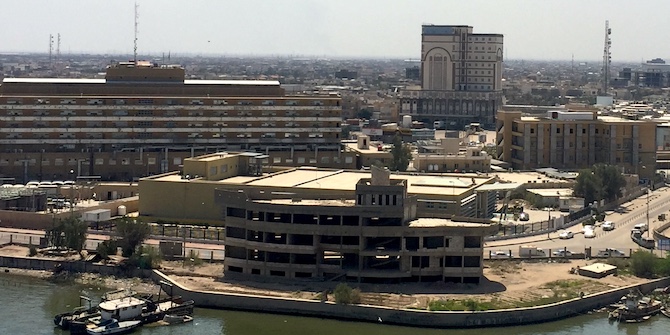
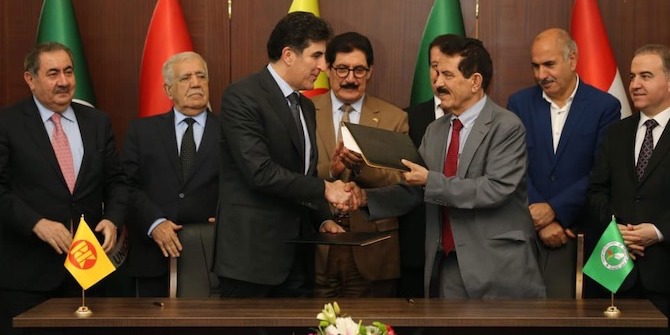
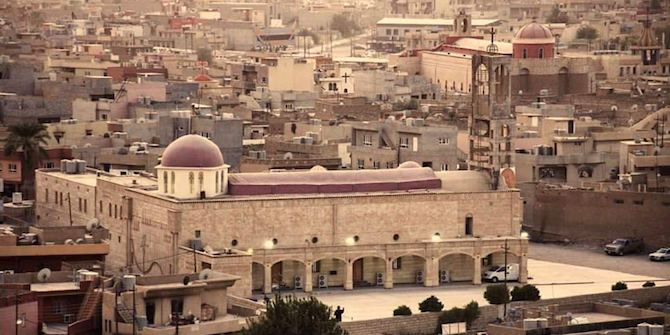
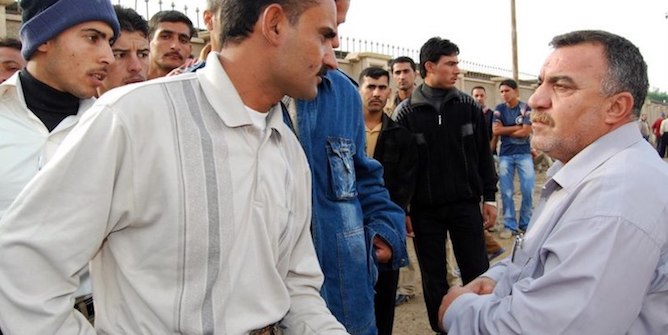
4 Comments